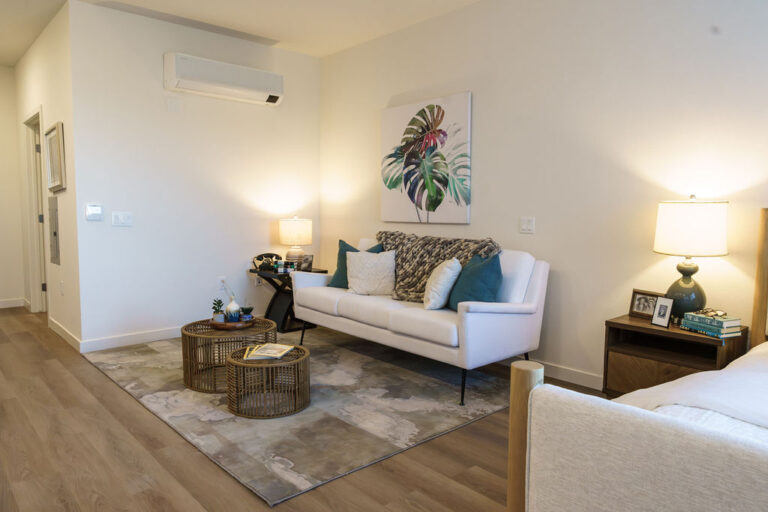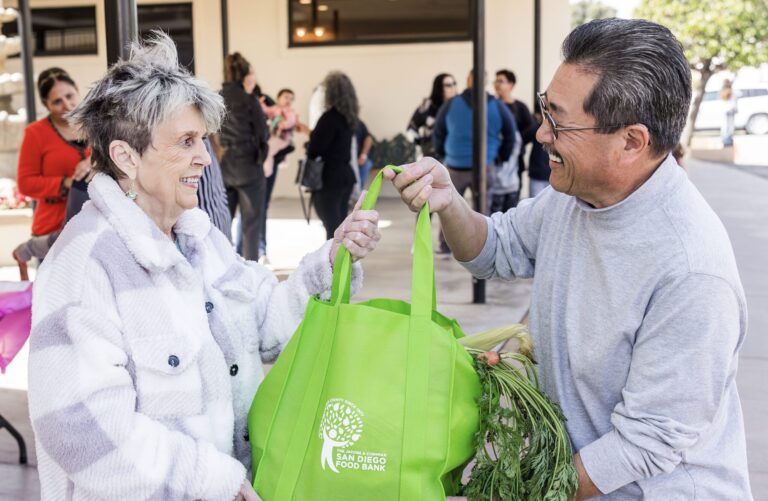The center brings together 88 partners to offer assistance in the North County
By NCI
One Safe Place
The North County Family Justice Center
1050 Los Vallecitos Blvd., San Marcos
(760) 290-3690
Open Monday–Friday 8 a.m. to 8 p.m.; Saturday mornings 8 to 12; after hours available
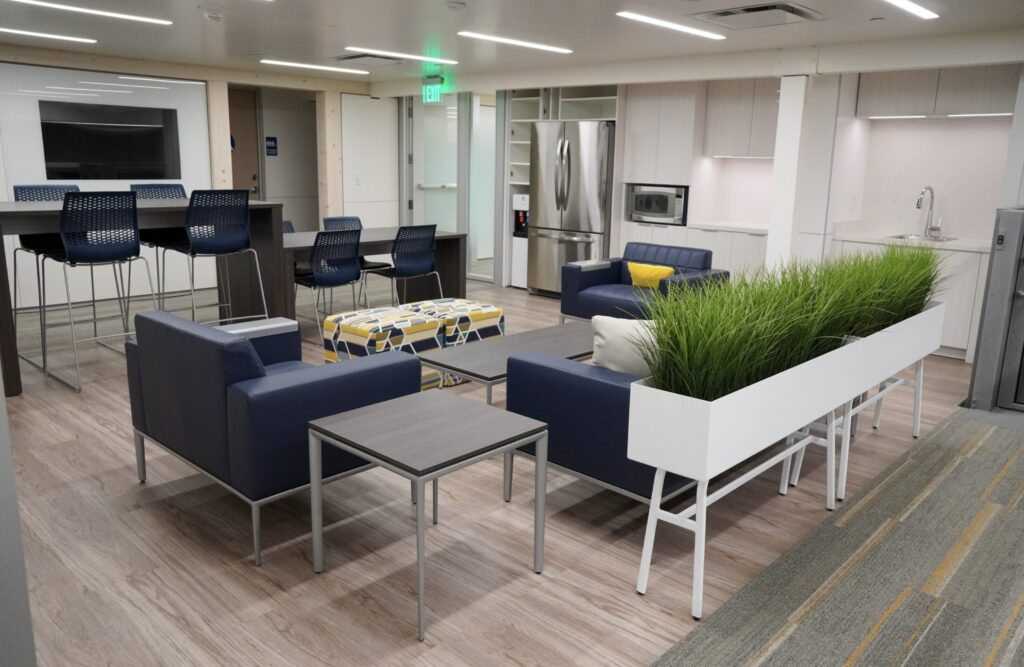
Here in the North County, victims of abuse find all the help they need in One Safe Place. The center assists victims of domestic violence, sexual assault, human trafficking, child abuse, elder abuse, hate crimes, gang violence, and more.
North County Informador took a tour of the North County Family Justice Center’s One Safe Place and talked to Claudia Garcia Grasso, the executive director.
“About a year ago our [San Diego County] District Attorney Summer Stephan asked me to take on the role of executive director. It’s been an amazing experience,” said Grasso, who is also the president of the San Diego Domestic Violence Council and a prosecutor in domestic violence and child abuse cases.
Once Safe Place is modeled after the first one built in downtown San Diego in 2002, under then City Attorney Casey Gwinn. President George W. Bush got behind the model and supported it with $20 million, Grasso told us, and the model was a huge success.
“When you co-locate services under one roof, so victims don’t have to drive all over to get to various services, it just works,” she said.
There are currently 200 centers with this model in 15 countries; 150 of them are in the United States. Grasso told us that every city with a Family Justice Center has seen a decrease in repeat domestic violence cases and homicides.
Anyone can get services, even people with no documents. The center runs a conflict check to make sure that perpetrators and victims are not in the center at the same time to keep people safe, but no documentation is required. “It’s a case-by-case basis,” Grasso said, “depending on the needs and the situation of the guests and members. We evaluate each case as they come in.”
Language is also not a barrier. “We speak English, Spanish,” said Grasso. “We also employ a language line that has 150 languages, including American Sign Language.”
Everyone who uses One Safe Place is called a guest or member, and most guests learn about the place just when they need it. “We went out and trained every single law enforcement in North County about One Safe Place…. many of the patrol officers now know that if somebody needs services from the scene of the crime, they bring them here,” Grasso explained.
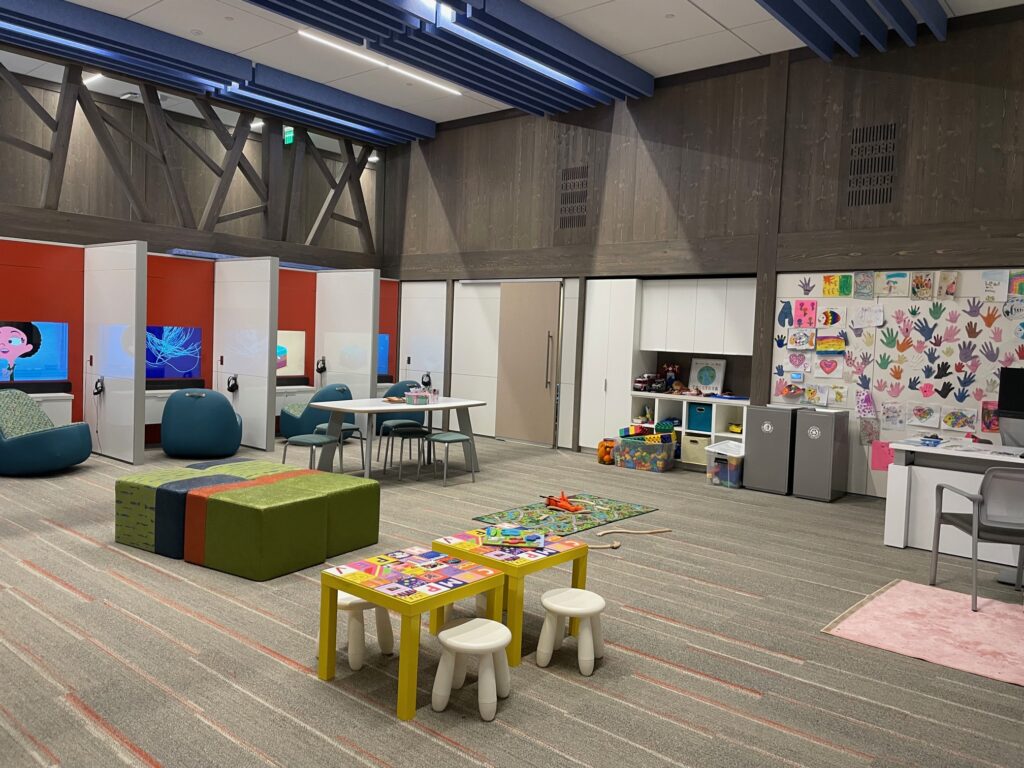
Safety and Comfort for Guests
Grasso explained how the center works. First, the Welcome Ambassadors direct guests to the welcome hub, where a huge pyramid representing protection greets them.
“The minute you walk in, you are safe, and we’re here to help,” said Grasso. Anyone who comes in hungry can use the stocked refrigerator and snacks, she added. “We want to make sure that someone is comfortable and ready to get assistance.”
Many guests of the center have only the clothes on their back and are in crisis mode. “We offer them a cup of coffee, a glass of water. Have them have a moment. We have plenty of private rooms… to take a breather. And then when they are ready, we continue,” Grasso told us.
Every square inch of the center is designed to help guests. “We were very mindful of colors, layout, make it as soothing and as comforting to guests and members. All of our plants here are alive. Because there are studies that show that nature contributes to healing,” said Grasso.
One Safe Place has several “hope rooms” where guests are welcomed by care coordinators. There, they go over risk assessment and a needs assessment. “They offer “Faraday” bags that disable electronics so guests can’t be tracked.
The safety plan is focused on three things—stalking, strangulation and firearms, Grasso told us “We ensure that they’re not being followed.” She explained that when strangulation becomes part of a relationship, the risk of homicide increases 700%, and when firearms are introduced, the risk skyrockets.
Next, the needs assessment determines the guests’ immediate and long-term needs, which include restraining orders, shelter, food, clothing, and therapy. These needs are bet by the center’s 88 current partners, who provide their own staffing and funding. “Everything we provide, every single service, is free of charge,” said Grasso. “No partner is allowed to charge anything here at One Safe Place. They bring in their own funding to do that.”
We’re the conveners,” said Grasso. “We convene all the partners here who bring with them their staff and they respond to the service.”
Room for Everyone
One Safe Place is 44,000 square feet of rooms and open spaces all designed around the needs of its guests.
Child waiting room: “This is a room of empowerment,” Grasso told us. Inside, we saw blocks, computer screens, art projects, and puzzles, as well as space to sit or move around. Grasso explained that children are told they are loved, special, and unique.
“Most if not all the children that come in here are affected by trauma. They are the direct victims of abuse or they’re watching the violence happen at home. … We want to approach the entire family, the multi-generational of abuse,” she said.
“Thanks to our partners, every child that comes in here leaves with a brand-new book,” said Grasso. “When you have escaped a situation with just the clothing on your back, having something to take with you that is now yours, after you left all your property behind, it just goes a long way.”
Palomar Health Wing: Grasso explained that One Safe Place cannot provide medical services, but some of its partners can. Guests taken to neighboring clinics or to Palomar Hospital for treatment are later brought back to One Safe Place for services.
Palomar Healthcare helps One Safe Place with sexual assault forensic exams, the domestic violence forensic exam, forensic interviews of children, and therapy.
The center also has after-hour services for Palomar Health and law enforcement to enter so that exams can be done as soon after an incident as possible.
The exam rooms are spacious and comforting, with an adjoining shower. “These forensic exams follow a very traumatic incident, but we try here to make it the most comfortable for our guests as possible,” Grasso told us.
Three Forensic interview rooms: Grasso explained that, per protocol in San Diego, when a child 13 and under discloses abuse, officers do a minimal interview and then take them for a forensic interview at Rady Children’s Hospital Chadwick Center in Kearny Mesa, or here at One Safe Place—the only two in San Diego County.
“We try to use the empowerment approach when we allow children to tell us what happened to them in their own words,” she told us. She showed us the cameras in the rooms that record the interview because a child only tells the story once. There is also a viewing room where a district attorney, detective, or social worker can watch the interviews and type in any questions for the interviewer, who is the only person in the room with the child. The walls of these rooms are whiteboards where children can draw their experience.
Victims can also report crimes. “Sometimes when guests and members become empowered in their journey here, they want to report, and going to a police station can be a little scary,” Grasso told us. “Having the ability to report in a place that you’re already comfortable in… there is no pressure or expectation to report a crime or follow through with prosecution. We meet people where they are and help them through their journey,” she added.
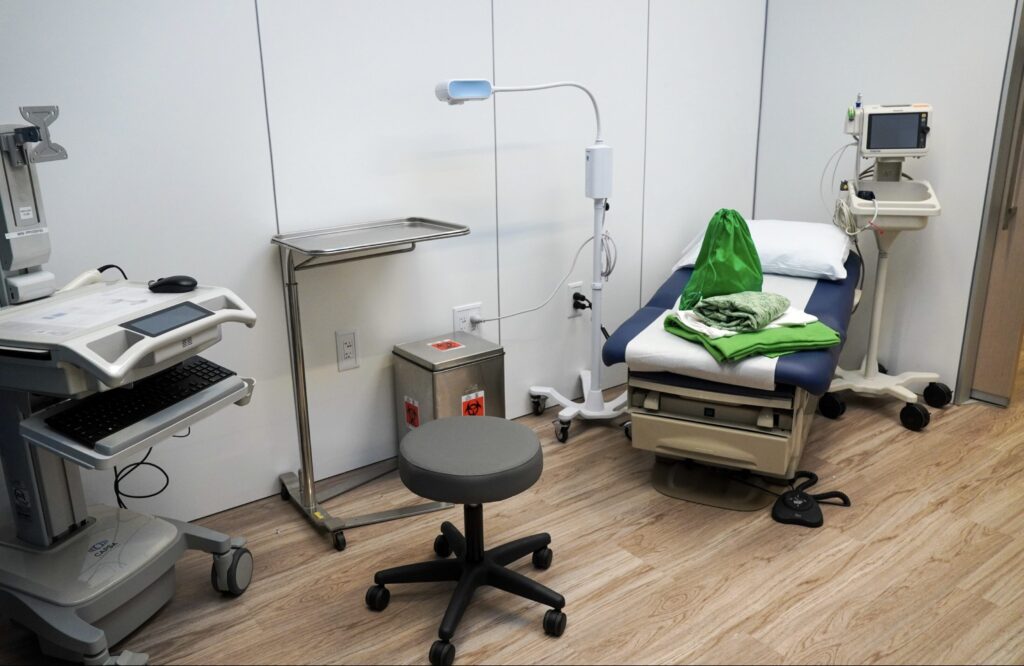
Nine therapy rooms: The center also hired therapists for each room, offering therapy for families, individuals, adults, and children. “We have therapists that focus on grief following a death, one that focuses on LGBTQ, one that focuses on teens, or they focus on children,” said Grasso. In these spaces, that are set up like a living room and have a scene of nature on the walls, the therapist sits behind a partial wall in his or her office. The center also offers art and music therapists, who Grasso said are very popular.
Non-denominational faith room: Guests and staff can mediate, pray, or talk to a chaplain. There are prayers rugs, a cross, a Bible. “If somebody wants this during their healing, we have that available,” said Grasso. “But also, we are very mindful because it takes its toll and you never know how a case is going to affect you.” So, this room is also available to staff.
Legal wing: The center offers legal help with restraining orders so that victims do not have to face their abusers in court. They can participate in their court case remotely from One Safe Place. “They don’t have to sit in that same room and be intimidated or scared or traumatized. We can do it here,” said Grasso. Pro bono attorneys also help with immigration and elder law.
Mothers’ room: A resident artist created a sculpture for this room that is for anyone who needs to nurse, Grasso told us. It also serves to have a moment to take a breather.
Thriver services: After people leave an abusive relationship, they may have no way to support themselves or their children, so the chances of going back to an abusive situation are high, Grasso explained. “Via partners, we have our job monthly workshops that, once somebody graduates, they’re matched up with a job via Goodwill,” she said. One Safe Place also has computer portals to print out court documents, look for a job, or build a résumé. It is working with Palomar College to bring English classes, “which is empowerment,” she added.
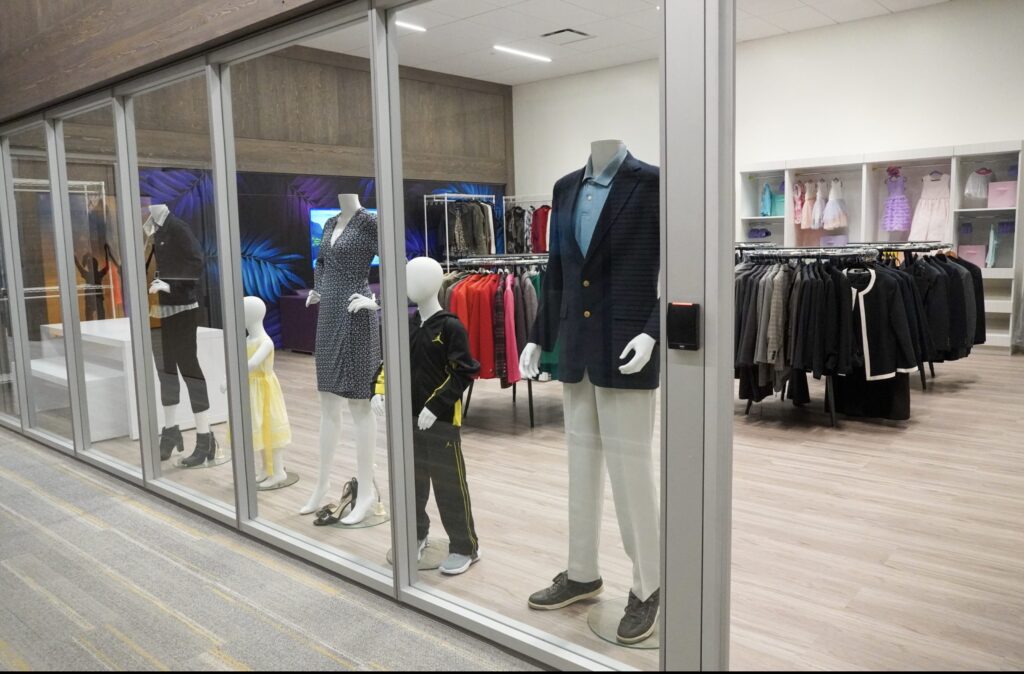
Food and clothing: One Safe Place helps guests navigate healthcare, CalWorks, and CalFresh. There is also a dress-to-thrive boutique with new and nearly new clothing. “Victimization, abuse strips you of your self-worth, of your dignity,” Grasso told us. “We have the ability to provide seven days’ worth of clothing…hygiene kits. We have access to diapers, wipes, formula.” An adjoining beauty salon allows volunteer stylists to give haircuts.
Training kitchen: One Safe Place does not regularly give out food, but it does have pantry. Guests can be given groceries for seven days, and an in-house nutritionist helps with classes for guests and members, said Grasso. Some classes include cooking healthy on a budget, making dinner for four for under $12, preparing entire meals with a microwave, and preventing diabetes.
Pets: Having a pet is not a barrier to leaving an abuser. One Safe Place has a pet fostering system and access to free vet care and grooming until a guest is able to get back on their feet and pick up the animals, Grasso explained.
Community training room: A large conference-style area that can be split into smaller rooms serves to host community outreach events Saturdays or evenings every month. Past topics in English and Spanish have included labor trafficking, human trafficking, fentanyl, healthy relationships for teenagers, and protecting elders from scammers. The Mexican Consulate has held its mobile consulate at One Safe Place, with a college event for first-generation students.
How to donate: Palomar Health has set up a foundation earmarked for One Safe Place. https://www.palomarhealthfoundation.org/one-safe-place/
One Safe Place has 88 committed partners
Categories of services through partners
- Arts
- Awareness
- Child Abuse Prevention & Awareness
- Child Friendly Activities
- Child Support
- Clothing
- Crisis Response
- Criminal Record Relief
- Developmental Disabilities
- Diverse Populations
- Domestic Violence
- Early Childhood Development/Prevention
- Educational Advocates
- Elder
- Eligibility/Benefits
- Empowerment Skills
- Faith Based
- Foster Care
- FJC Network-Ancillary Services
- Food
- Funding the Gaps
- Grief
- Healthcare
- Housing
- Homelessness
- Human Trafficking
- Immigration Services
- Justice-involved and/or assistance with Clearing criminal record/re-entry
- Kids Exposed
- Law Enforcement
- Latino/a/x communities
- Legal
- Literacy
- LGBTQ
- Mental Health/Trauma
- Mentoring
- Military
- Online Connection to Resources
- Pets
- Prevention
- Sexual Assault
- Trauma Therapy
- Tribal Communities
- Thriver Skills/Workforce Readiness
Numbers from July 6, 2022 to March 18, 2023
- 1,798 unique, first-time guests seeking services
- 1,366 repeat visits for additional support
- 3,519 pounds of food
- 5,400 items of clothing and hygiene kits
- 529 attorney consultations on restraining orders, domestic violence move out orders, child custody visitation orders, remote hearing facilitation
- 366 connections to trauma therapy, including art and music therapy
- 38 haircuts
- 202 members connected with emergency housing or shelter
- 38 pets including dogs, cats, birds, a snake, and 3 rodents
- 1,019 children served in waiting room
- 1,035 children’s books given out
- Some 78 “Faraday Bags” to keep victims from being tracked
- 25 cooking class lessons; 20 drop-in food demonstrations



